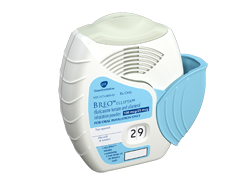GlaxoSmithKline ($GSK) has a vision for its respiratory unit that looks not unlike the portfolio approach some diabetes drugmakers have taken, with a range of therapies for different disease stages and different types of patients. And last week, the FDA approval of an add-on treatment for a subset of severe asthma patients brought it one step closer to achieving that vision.

GSK SVP of primary care Deborah Waterhouse
Now, GSK has that treatment--an injectable dubbed Nucala--to treat asthma with eosinophilic inflammation, a condition the company says affects 60% of severe asthma patients. And the new med helps put the company "in a really unique position from a portfolio perspective," Deborah Waterhouse, GSK's SVP of primary care, told FiercePharmaMarketing in a recent interview.
"What's coming together for us is … the concept of the platform--everything in the Ellipta device, the strong portfolio, the proposition that GSK can offer, when you can go from Ventolin on one end to Nucala on the other and everything in between," she said.
 That sort of concept has its advantages. If a patient's disease evolves over time and requires moving from one drug to another, doctors don't have to teach the patient anything new; if he or she is moving from ICS Arnuity Ellipta to ICS/LABA combo Breo Ellipta, for example, "it's always the same device with a great molecule inside it," Waterhouse pointed out.
That sort of concept has its advantages. If a patient's disease evolves over time and requires moving from one drug to another, doctors don't have to teach the patient anything new; if he or she is moving from ICS Arnuity Ellipta to ICS/LABA combo Breo Ellipta, for example, "it's always the same device with a great molecule inside it," Waterhouse pointed out.
And for payers looking to strike deals with drugmakers at a portfolio-wide level, "we're very well placed to take advantage of that," she said.
It's a strategy other drugmakers have already picked up on; both Novo Nordisk ($NVO) and AstraZeneca ($AZN) currently employ it for their diabetes businesses, both of which feature solo meds and combos that doctors and patients can move among in order to find what works.
But Glaxo will need more than just that strategy to rebound in respiratory, an area that's been pummeled recently as generic versions of giant Advair take their toll overseas and aggressive discounting with payers bites into the drug's U.S. revenues.
On that front, GSK says, slow starters Breo and Anoro--heralded as potential future blockbusters when they won approval in 2013--are starting to step up. Since June, Breo has increased its share of the ICS/LABA market from 3.3% to 4.7%, while Anoro has moved from 3.7% to 4.9%, according to spokeswoman Karen Hagens. Together, the meds pulled in £41 million in Q3, more than doubling their haul from the same period in 2014.
Special Reports: The top 15 companies by 2014 revenue - GlaxoSmithKline | The 10 best-selling drugs of 2013 - Advair/Seretide